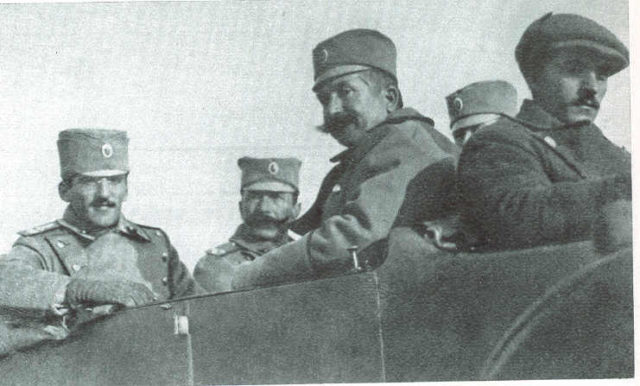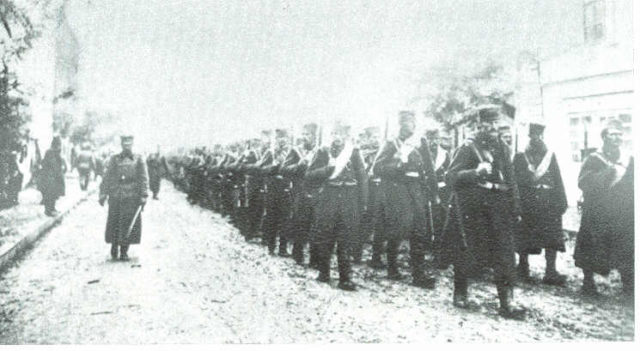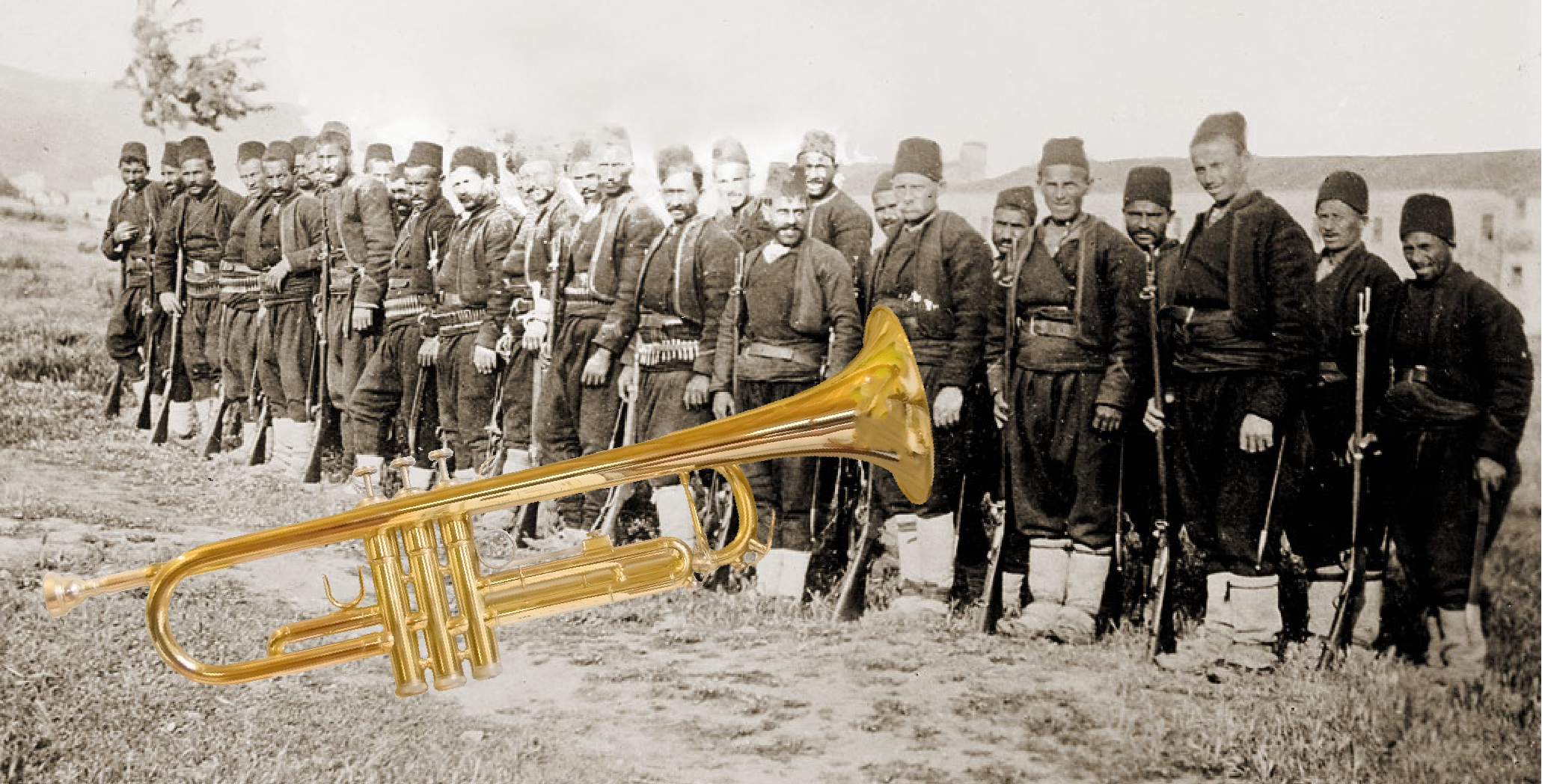When the Balkan Powder Keg was lit in 1912, war broke out. The peoples of the Balkan Peninsula were seeking independence from the Ottoman rule which in some areas dated back to the Middle Ages. Combined forces of Serbian, Montenegrin, Greek and Bulgarian troops agreed to drive out the Turks for good.
One of the most crucial battles of the war happened near the Macedonian town of Kumanovo on the23rd and 24th of October. The Serbian Army outnumbered the Turkish forces, but its numerical superiority was plagued by a lack of proper military training, and by inferior equipment.
This was also the first major battle of the war. Turkish and Serbian-Bulgarian troops amassed near the town of Kumanovo, after the declaration of war.
The Serbian Army believed in a decisive battle that would cause the bulk of the Ottoman troops to disperse. Unable to stage an effective counter-attack, they would retreat from the Balkan Peninsula. Ottoman rule had been severely weakened during the last years of the 19th century. The Sick Man at the Bosphorus – as Turkey was called in European diplomatic circles – was losing its foothold on the Balkans. The mobilization of the province of Macedonia proved to be harder than had been thought. The Macedonians refused to join the Turkish Army, and the ones who did join had to be pressed into service.
The Turks decided that surprise attack was their only chance. It was planned that the battle would happen south of the town of Kumanovo, but instead, the Turks headed north. While the Serbian First Army, led by Prince Alexander I, was still advancing towards the south, the Serbian rear was already in combat. This confusion acted as a game changer.

Then an unlikely hero arose from the confused Serbian troops ― a trumpeter! Ahmed Ademovic was of Roma origin, who as a people were often marginalized in Balkan societies. Many Roma people were esteemed musicians, as their talent was undoubted. Just think of Django Reinhardt!
Well, the trumpeter of the Serbian Army, Ahmed Ademovic, wasn’t exactly Django Reinhardt, but he was more than capable of mimicking the Ottoman sound for retreat, though he had only heard it once before.
His detachment was preparing for a full frontal attack by the Turkish Army, which was determined to bypass the bulk of the Serbian Army and crush the resistance by dividing it into small pockets.
When the Turks began their charge, Ademovic managed to slip through, as the battle was heating up. He was sneaking behind enemy lines, with only a trumpet in his hand. An act of courage or sheer madness, he did something for what he would be remembered for the rest of his life. Having learned the call for the retreat he sounded it as loud as he could. The Ottoman Army was surprised and lost momentum. Some of them followed the false order, while some continued to march forward. There was chaos within their ranks. And all thanks to the magic trumpet of Ahmed Ademovic.
But to ensure the victory, Ademovic had to run back to his lines and sound the attack, for that was how large armies oriented on the battlefield at the time. It was necessary to follow the signals, for a common soldier didn’t have an overview of the situation.
Ahmed then ran as fast as he could, arriving just in time to seize the moment. The Serbian Army, after hearing the call for the charge, started their counter-attack, driving the Ottomans from the battlefield. The Serbian Army suffered a large blow because of its lack of organization and misinterpreted the movement of the Ottoman Army. As the battle was coming to a close, the Serbian headquarters were still convinced that this was a mere vanguard, judging from the lack of resistance, for they didn’t know about Ademovic’s endeavor.
Once the battle was over, the First Serbian Army headed for Skopje, as they thought the largest city in Macedonia was going to be the Turkish last stand. Instead, the Turks retreated all the way to Prilep, which is located in the deep south of the country. It was only in Prilep and a nearby town of Bitola that the Turks fought back, but by that time, the coalition of Serbian, Montenegrin, Bulgarian and Greek troops was well organized and determined to win.

Skopje surrendered without a fight. Once the story of a trumpeter who changed the course of battle was out, Ademovic received highest military honors. He was a bearer of the Karadjordje’s Star with Swords. He was one of three Romani trumpeters who received the medal, the other two being Lance Corporal Amet Ide Ametovic and Rustem Sejdic (rank unknown).
Originally from a Serbian town of Leskovac, Ahmed Ademovic became a local celebrity. He always wore his medal attached on his jacket, as he was well known and respected among fellow citizens. But the Second World War brought misery and suffer on Ademovic and his family. The Nuremberg Laws clearly stated that the Romani people were “enemies of the race-based state,” the same category as Jews. Occupation of Yugoslavia saw numerous Romani men, women, and children perish in concentration camps all over Europe.
Ademovic’s both sons, Rama and Reja were both killed by the Germans. They were among the 500 Romani men shot in Leskovac, on the 3rd of December, 1941. After the war, a monument to the victims was erected on that place.
Ahmed Ademovic luckily survived the war, but he never came to terms with witnessing his sons die. He spent his last years living with his grandson, Fadil. Ahmed Ademovic died in 1965 when he was 92 years old. His clever trick is today part of military textbooks in academies in Russia and France, as it demonstrates the cunning of a single soldier opposed to an entire army.
